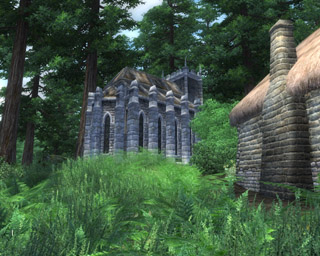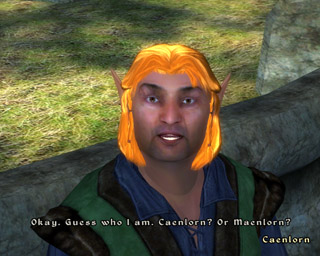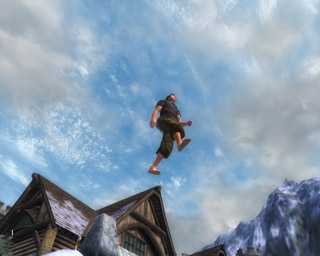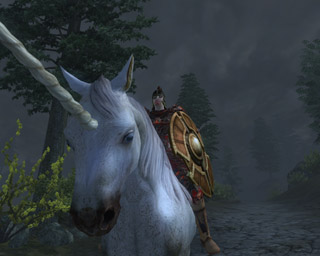
So, Oblivion then.
I’ve put in about 100 hours so far, which goes some way to explaining why this site hasn’t been updated for a while.
The game is currently being experienced by about two million people, which is pretty good going considering it’s not exceptionally mainstream in terms of genre or hardware requirements (God knows how many copies it would have sold by now if by some miracle they’d been able to cram it onto the PS2). It’s the work of a big team of people who are very, very good at what they do, and have been honing their skills to a specific end for about a decade. On top of which they have a virtually limitless budget at their disposal (which could lead off into another discussion about how sometimes Hollywood-sized development budgets can be justified – I would say Oblivion makes a better case for this than GTA:SA or this season’s flabby EA blockbuster).
Reviewers everywhere have been falling over themselves to heap praise on it, even in cases where they’ve neglected to mention anything about the sodding game. (It’s such a shame they won’t just let PC Zone die.) In the face of all this evidence it would be difficult to convince people that Oblivion is rubbish, so it’s quite lucky that it’s actually rather brilliant.
Trying to encapsulate the experience feels rather how I expect a snake feels swallowing an egg. It takes some considerable time and effort to discover, become familiar with, and eventually tire of all of the game’s systems. However unless you are entirely not cut out for computer games, you will enjoy the process of getting to that point.
There’s a bit in the ‘Making Of’ documentary on the bonus disc, where Todd Howard (who is related to Ron, yes? He looks and sounds uncannily like him) boils the game down to (and I paraphrase) “killing monsters and taking their loot, buying bigger weapons and killing bigger monsters”. So in other words, it’s Diablo. Or more accurately, it’s a big bag of several hundred small, contextless dungeons with a whole clockwork virtual world pasted on top for the sake of appearances. This is an observation rather than a criticism. To be fair, Oblivion is more rewarding than a straightforward ‘click-fest’ action RPG, but it’s hard to deny that the ‘role-playing’ side of things isn’t as well realised as it could be.

Conversations are full of false choices (often there is only one conversation option, such as “Slay twenty demon princes with a toothpick to rescue your kitten? Consider it done!”, regardless of whether you’ve given up chivalry as a mug’s game and have spent the game wantonly murdering everything you can’t steal and vice versa). While characters are now supposedly driven by advanced AI, they still seldom take any actions of their own which alter the world or other characters (apart from killing each other, dependent on the player being present and having instigated their hostile state), beyond what was possible in Morrowind. Conversations between NPCs are restricted to idle banter about plot events and thinly disguised player tips. Occasionally, by happy accident, these conversations heighten the atmosphere of the game (at one point, an NPC whom I had helped fake his death immediately launched into a conversation with another NPC who told him that he’d heard that he had been killed – only slightly marred by the fact he refered to him in the third person…).
Oblivion is a very broad and reasonably deep experience. It’s the current state of the art for a ‘sandpit’ game, taking the crown from Grand Theft Auto: San Andreas (and its siblings). The key difference to Bethesda’s approach is that all the designed content (while not all of it is particularly imaginitive) plays to the game’s strengths, instead of wasting a large percentage of effort on gimmicks, technical experiments, minigames, radio-controlled vehicles and all the other half-baked fuckery-foo that you’re forced to do in GTA:SA and yet strangely never features in the glossy adverts. In Oblivion, the sheer number of juicy bits of content you can stumble across just walking down the road to the shops (let alone while riding halfway across the continent) ensures you’re never short of options as to what to do next.

There are of course, lots of subjective criticisms that I could table about the game, most of which fall into the category of things that are done better in other games: Betrayal at Krondor (to which the game owes a significant debt in many areas) had a better conversation system and more effectively used text descriptions; Ultima IV had a morality system that meant there was a consequence to performing unvirtuous acts (what’s the point of beggars asking you for money in Oblivion? They serve no purpose in the game beyond being convenient batteries for vampire characters); Arx Fatalis had a far cooler (albeit cheesy and limited) system of object interaction, for example you could make an apple pie by combining flour and water, rolling the dough with a pin, adding apples and placing the pie over a fire to cook – far better than carting around hundreds of types of barely-distinguishable potions.
A really glaring missed opportunity is the implementation of Havok physics. There are literally no instances anywhere in the game where you’re ever required to physically place objects in the world. No setting traps, no placing the ingredients at the correct points of the pentagram, no friendly games of chess in the Inn (and no ‘accidentally’ spilling your opponent’s pint). Presumably this is a concession to Xbox 360 players who would struggle having to pick and place objects with a joypad.
With all these nitpicks it probably sounds like I wasn’t impressed with the game, which would be unfair. For the vast majority of the playing time, Oblivion is a truly exceptional game. Many of the larger quests and series of quests are captivating, guiding the player through a tortuous series of objectives without feeling overly contrived. The Dark Brotherhood (a.k.a. Assassin’s Guild) quests in particular seem to have had a great deal of care and attention lavished on them. The notorious Vampire Cure quest (essentially a fetch quest with a very long shopping list) was particularly memorable in my experience – even though I managed to make it harder for myself by getting suspended from the Mages’ Guild. Most of the items can be found much more easily than might be expected with a little ingenuity. The final payoff, walking out of Skingrad Castle at dawn, without recoiling at the sunlight, looking up into light rain shower as the soundtrack did its epic and yet understated thing, was one of those moments that remind you of how good games can be.

What more can I say? Well, the graphics are thankfully not rubbish. I was expecting the worst from what I remembered of Morrowind, and I usually hate fantasy settings with a passion, but they’ve managed to make the world look pretty in places and at least inoffensively shiny the rest of the time. (I highly recommend this guide if you’re playing on a PC that isn’t designed and built by ninjas.)
I haven’t found the much-maligned leveling system (whereby monsters and loot scale up with your XP to prevent the game from becoming a walkover) to be a problem.
The only mystery is where they’re getting all that cheese from when there aren’t any cows.
And why or how exactly do Argonian women have breasts?
Tags: elder scrolls, Game, game title, multiplatform, oblivion, PC
